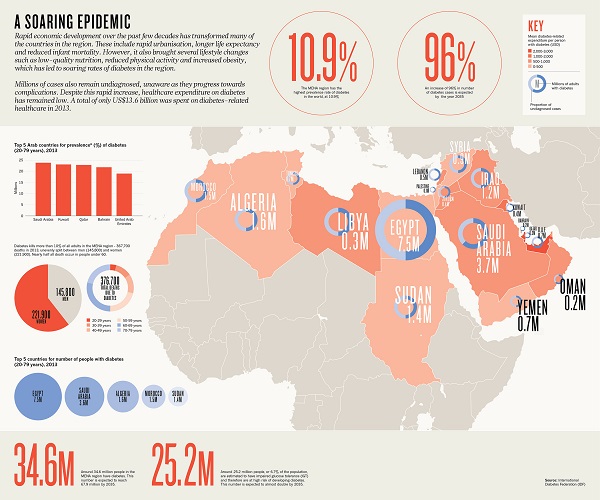Using AI to control energy for indoor agriculture
30 September 2024
Published online 14 November 2014
The rapid change of lifestyle in the Middle East over the past few decades have led to soaring rates of diabetes across the whole region.

© Nature Middle East/Infograph by Amr Rahma
Enlarge image
With the rapid economic growth during the past few decades across many countries in the Middle East came many blessings and a few – albeit dangerous – side effects.
The wide infrastructure development, rapid urbanization. increased life expectancy and reduced infant morality also translated into lifestyle changes that included reduced physical activity, increased obesity, increased smoking and the spread of low-nutrition fast food. These in turn led to soaring rates of diabetes across most countries in the region, especially the Gulf states.
With nearly 35 million people diagnosed with the disease, the Middle East and North Africa have the highest prevalence level in the world, with 1 in every 10 people living with the disease.
Healthcare expenditure has failed to keep up with the rapid increase in diabetes. In 2013, all the countries in the region spent US$13.5 billion on diabetes healthcare, just 2.5% of global spending on the disease. Egypt, the most populous county in the world and the one with the highest number of cases, spent a mere US$176 per person with diabetes.
While the expenditure on diabetes is set to double by 2035, it will hardly be enough to halt or slow the spread epidemic. Millions of people with diabetes remain undiagnosed, and late diagnosis is still widespread in most countries, which burdens the healthcare system further due to the disease's complications.
With diabetes killing more than 10% of all adults in the region, and nearly half of these under 60, the cost to society and development due to the disease and other metabolic syndromes is high and rapidly growing. The Middle East needs more effective healthcare systems, higher awareness among people and a change of lifestyle in order to stop the spread of one of the most prevalent diseases they have faced.
doi:10.1038/nmiddleeast.2014.265
Stay connected: